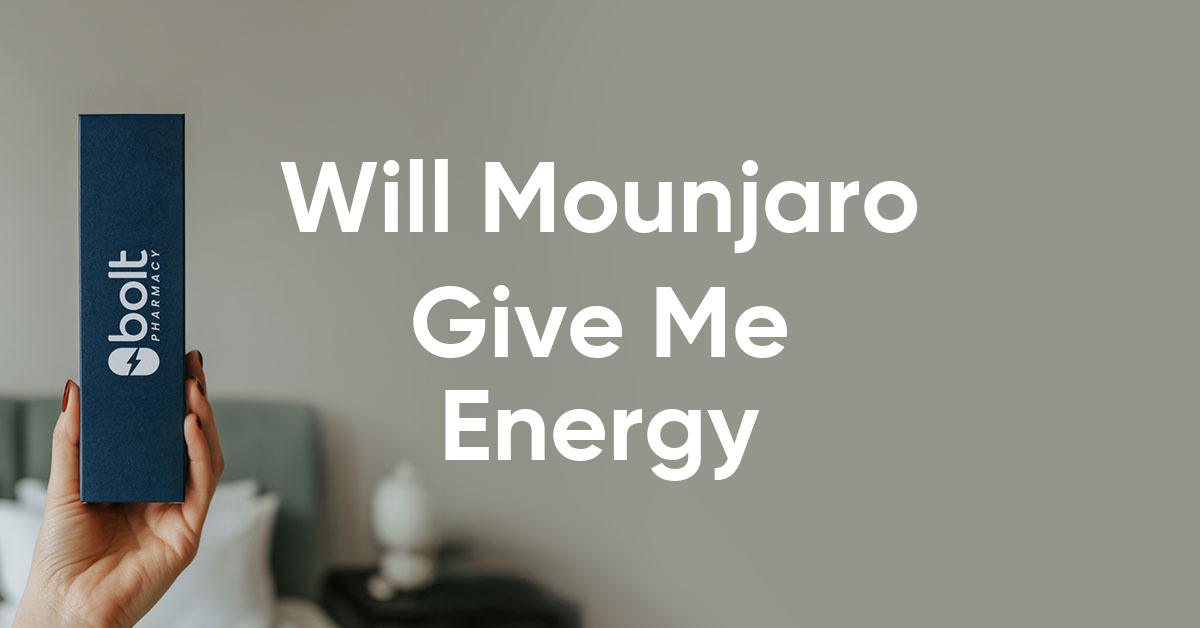Mounjaro (tirzepatide) is a prescription medicine licensed in the UK for type 2 diabetes and weight management in adults with obesity or overweight with weight-related conditions. Whilst Mounjaro is not a stimulant and does not directly provide energy, many patients report feeling more energetic after starting treatment. This improvement typically results from better blood glucose control, weight loss, and improved overall metabolic health. However, side effects such as nausea, fatigue, and gastrointestinal disturbances may temporarily reduce energy levels, particularly during initial treatment. Understanding how Mounjaro affects your body can help you manage expectations and recognise when to seek medical advice.
Summary: Mounjaro does not directly provide energy but may indirectly improve energy levels through better blood glucose control and weight loss.
- Mounjaro (tirzepatide) is a dual GIP and GLP-1 receptor agonist licensed for type 2 diabetes and weight management in the UK.
- The medication works by stimulating insulin secretion, suppressing glucagon, slowing gastric emptying, and reducing appetite.
- Improved blood glucose control and weight loss may lead to increased energy, better mobility, and enhanced sleep quality.
- Common side effects include nausea, vomiting, diarrhoea, and fatigue, which may temporarily reduce energy during initial treatment.
- Contact your GP if fatigue persists beyond one month, or if you experience severe dehydration, hypoglycaemia, or severe abdominal pain.
- Mounjaro is administered as a once-weekly subcutaneous injection, starting at 2.5 mg and titrated up to a maximum of 15 mg weekly.
Table of Contents
What Is Mounjaro and How Does It Work?
Mounjaro (tirzepatide) is a prescription medicine licensed in the UK for the treatment of type 2 diabetes and, more recently, for weight management in adults with obesity or overweight with weight-related health conditions. In the NHS, weight management prescribing follows NICE criteria and is typically provided through specialist weight management services.
Mounjaro belongs to a class of medications known as dual glucose-dependent insulinotropic polypeptide (GIP) and glucagon-like peptide-1 (GLP-1) receptor agonists. It mimics the action of two naturally occurring hormones that help regulate blood sugar levels and appetite.
Tirzepatide works by stimulating insulin secretion when blood glucose levels are elevated, suppressing the release of glucagon (a hormone that raises blood sugar), and slowing gastric emptying. These combined actions help to improve glycaemic control in people with type 2 diabetes. Additionally, Mounjaro acts on areas of the brain involved in appetite regulation, leading to reduced hunger and increased feelings of fullness, which supports weight loss.
The medication is administered as a once-weekly subcutaneous injection, starting at an initiation dose of 2.5 mg for 4 weeks. The dose is then increased by 2.5 mg every 4 weeks or more as tolerated, up to a maximum of 15 mg weekly. Mounjaro is not indicated for type 1 diabetes or diabetic ketoacidosis, and is not recommended during pregnancy or breastfeeding. It should be used with caution in people with severe gastrointestinal disease or gastroparesis.
Mounjaro is not a stimulant and does not directly provide energy in the way caffeine or other stimulants might. However, its effects on metabolism, weight, and blood sugar control can indirectly influence how energetic a person feels.
Why Some People Feel More Energetic on Mounjaro
While Mounjaro is not designed to boost energy directly, some people may feel more energetic after starting treatment. This improvement is typically an indirect benefit resulting from several physiological and lifestyle changes associated with the medication, though evidence for direct energy changes is limited.
Improved blood glucose control is one of the primary reasons people with type 2 diabetes may experience increased energy. Poorly controlled blood sugar can cause fatigue, brain fog, and general lethargy. By helping to stabilise glucose levels, Mounjaro may reduce these symptoms, leading to more consistent energy throughout the day. Patients often notice they no longer experience the extreme highs and lows associated with fluctuating blood sugar.
Weight loss is another significant factor. Carrying excess weight places additional strain on the body, affecting mobility, sleep quality, and overall physical stamina. As patients lose weight on Mounjaro, many report feeling lighter, more mobile, and better able to engage in physical activity. This can create a positive feedback loop: increased activity improves fitness and energy levels, which in turn supports further weight loss and metabolic health.
Additionally, some individuals may experience improved sleep quality as they lose weight, particularly if they previously had conditions like obstructive sleep apnoea. Better sleep naturally translates to feeling more rested during the day. The psychological benefits of achieving weight loss goals and better diabetes control can also improve mood and motivation, contributing to an overall sense of well-being.
It's worth noting that early treatment side effects can temporarily reduce perceived energy before stabilising as your body adjusts to the medication.

Common Side Effects That May Affect Your Energy
Despite the potential for increased energy, Mounjaro can also cause side effects that may temporarily reduce your energy levels, particularly during the initial weeks of treatment or after dose increases. Understanding these effects can help you manage expectations and take appropriate steps to minimise discomfort.
Gastrointestinal side effects are the most commonly reported and include:
-
Nausea (very common) and vomiting (common) – These can reduce appetite and make it difficult to maintain adequate nutrition and hydration, leading to fatigue.
-
Diarrhoea (very common) or constipation (common) – Digestive disturbances can disrupt nutrient absorption and cause dehydration, both of which may leave you feeling tired and weak.
-
Abdominal discomfort (common) – Bloating and stomach pain can interfere with eating patterns and overall comfort.
Fatigue itself is listed as a common side effect in the Mounjaro product information. These symptoms typically improve over time as your body adjusts to the medication. Eating smaller, more frequent meals and avoiding high-fat or spicy foods may help reduce nausea. Staying well-hydrated is essential, especially if you experience vomiting or diarrhoea, as dehydration can lead to acute kidney injury in severe cases.
Hypoglycaemia (low blood sugar) is another potential side effect, particularly if Mounjaro is used alongside other diabetes medications such as insulin or sulfonylureas. Symptoms include shakiness, sweating, confusion, and profound fatigue. If you experience these symptoms, treat low blood sugar promptly with 15-20g of fast-acting carbohydrate (like glucose tablets or fruit juice), recheck your glucose, and have a snack if your next meal is more than an hour away. Discuss dose adjustments of insulin or sulfonylureas with your healthcare team.
Gallbladder problems including gallstones and inflammation (cholecystitis) can occur with Mounjaro. Symptoms include right upper abdominal pain, fever, and sometimes jaundice (yellowing of skin/eyes), which may contribute to fatigue and require medical attention.
If you experience persistent side effects that affect your energy levels, discuss these with your healthcare provider.
When to Speak to Your GP About Fatigue on Mounjaro
While some fatigue during the early stages of Mounjaro treatment can be expected, there are certain situations where you should contact your GP or diabetes specialist for further evaluation and guidance.
Persistent or worsening fatigue that does not improve after the first month of treatment warrants investigation. Fatigue can be a symptom of various conditions, including anaemia, thyroid disorders, vitamin deficiencies, or depression, all of which may require separate assessment and management. Your GP may arrange blood tests to check your full blood count, thyroid function, vitamin B12, vitamin D, and iron levels.
If you experience symptoms of severe dehydration—such as dizziness, dark urine, dry mouth, or reduced urination—especially in the context of vomiting or diarrhoea, seek medical attention promptly. Dehydration can significantly worsen fatigue and may require oral or intravenous rehydration. Your healthcare provider may also check your kidney function if dehydration is significant.
Signs of hypoglycaemia should also prompt urgent review, particularly if episodes are frequent or severe. Your healthcare team may need to adjust the doses of Mounjaro or other diabetes medications to reduce the risk of low blood sugar.
If you develop severe abdominal pain, persistent vomiting, or signs of pancreatitis (such as pain radiating to the back), you should stop taking Mounjaro and seek urgent medical advice, as these are rare but serious side effects of GLP-1 receptor agonists.
Finally, if fatigue is accompanied by unexpected or rapid weight loss outside your agreed treatment plan, jaundice (yellowing of the skin or eyes), or changes in mood, these symptoms require prompt evaluation to rule out more serious underlying conditions.
For urgent advice, contact NHS 111 or your GP. Call 999 for severe chest/abdominal pain, collapse, or confusion. You can report suspected side effects via the MHRA Yellow Card scheme (yellowcard.mhra.gov.uk or the Yellow Card app).
Frequently Asked Questions
Does Mounjaro directly increase energy levels?
No, Mounjaro is not a stimulant and does not directly provide energy. However, improved blood glucose control and weight loss may indirectly lead to increased energy levels and reduced fatigue over time.
Why do some people feel tired when starting Mounjaro?
Common side effects such as nausea, vomiting, diarrhoea, and dehydration can temporarily reduce energy levels, particularly during the first few weeks of treatment or after dose increases. These symptoms typically improve as your body adjusts to the medication.
When should I contact my GP about fatigue whilst taking Mounjaro?
Contact your GP if fatigue persists beyond one month, worsens over time, or is accompanied by severe dehydration, frequent hypoglycaemia, severe abdominal pain, or unexplained symptoms such as jaundice or mood changes.
The health-related content published on this site is based on credible scientific sources and is periodically reviewed to ensure accuracy and relevance. Although we aim to reflect the most current medical knowledge, the material is meant for general education and awareness only.
The information on this site is not a substitute for professional medical advice. For any health concerns, please speak with a qualified medical professional. By using this information, you acknowledge responsibility for any decisions made and understand we are not liable for any consequences that may result.
Heading 1
Heading 2
Heading 3
Heading 4
Heading 5
Heading 6
Lorem ipsum dolor sit amet, consectetur adipiscing elit, sed do eiusmod tempor incididunt ut labore et dolore magna aliqua. Ut enim ad minim veniam, quis nostrud exercitation ullamco laboris nisi ut aliquip ex ea commodo consequat. Duis aute irure dolor in reprehenderit in voluptate velit esse cillum dolore eu fugiat nulla pariatur.
Block quote
Ordered list
- Item 1
- Item 2
- Item 3
Unordered list
- Item A
- Item B
- Item C
Bold text
Emphasis
Superscript
Subscript










